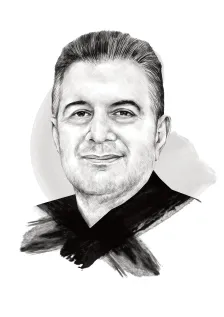On my way to the bank to check what's left of my savings, a small motorcycle leaps – or lands – in front of me; its driver almost slips under my car’s front wheel before hitting the mirror.
He greets me, saying, “Min bab el-amalieh (Begging your kindness),” as the Lebanese saying goes, before apologising and moving on, as if nothing had happened.
I thank God that he survived, I survived, and the car survived. But minutes later, the same thing happens again at the (non-functional) traffic lights; this time, however, the crash is more violent and scratches some paint off the left door.
The greeting is the same, though: a raised hand, “Min bab el-amalieh,” and “Sorry”. The delivery driver completes his journey to drop off two kilograms of LL100,000 notes, which he carries in a plastic bag, having just left a currency exchange shop where dozens of people were lined up and waiting their turn.
A few days after returning to Beirut, and you'll be brushing up on your road racing skills. We’ve become quite accustomed to these metal “kisses” to the front, back and sides of our cars.
As long as you don’t run over the other driver’s hand or take out their foot, and as long as you’re lucky enough to not get caught up with the kind of “opposed" driver who might kill you and say, “Sorry,” then nothing is out of the ordinary.
Sight to behold
Sometimes, you suspect that you’re the one breaking the law when a motorcycle drives towards you in the opposite direction to traffic, or swerves from one side of the street to another.
There are people who believe these incidents are done on purpose: bike drivers are trying to extort some “fresh” dollars off of you – especially considering that traffic laws always favour motorcyclists in accidents with cars.
Yet, one of the most dangerous sights in Beirut is this... A driver on a delivery motorcycle, smaller than a Vespa, carrying his entire family as passengers. Imagine: two kids and a wife (who’s carrying an infant), sitting in the front and back, with no space for any of them.




